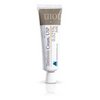 | Tretinoin 0,025 Active Ingredient: Tretinoin Tretinoin Cream is used for treating acne. |
| Package | Per Pill | Price | Savings | Bonus | Order |
|---|---|---|---|---|---|
| 20gm × 4 tubes | $11.34 | $45.36 | + Cialis | ||
| 20gm × 6 tubes | $9.82 | $58.92 | $9.12 | + Levitra |
INDICATIONS
Tretinoin Cream is used for treating acne. Tretinoin Cream works in the skin to reduce the formation of acne and to help acne heal more quickly.
INSTRUCTIONS
Use Tretinoin Cream as directed by your doctor.
- Tretinoin Cream is for external use only.
- Remove all cosmetics with a mild soap before applying Tretinoin Cream. Gently dry the area. Wait 20 to 30 minutes to make sure that skin is completely dry.
- Squeeze a small amount (quarter inch or less) of the medicine onto the fingertip. This should be enough to cover the entire affected area.
- Wash your hands immediately after using Tretinoin Cream.
- If you miss a dose of Tretinoin Cream, skip the missed dose and go back to your regular dosing schedule. Do not use 2 doses at once.
Ask your health care provider any questions you may have about how to use Tretinoin Cream.
STORAGE
Store Tretinoin Cream at room temperature, between 59 and 80 degrees F (15 and 26 degrees C). Store in a tightly closed container. Store away from heat and light. Keep Tretinoin Cream out of the reach of children and away from pets.
Do NOT use Tretinoin Cream if:
- you are allergic to any ingredient in Tretinoin Cream.
Some medical conditions may interact with Tretinoin Cream. Tell your doctor or pharmacist if you have any medical conditions, especially if any of the following apply to you:
- if you are pregnant, planning to become pregnant, or are breast-feeding
- if you are taking any prescription or nonprescription medicine, herbal preparation, or dietary supplement
- if you have allergies to medicines, foods, or other substances
- if you have eczema, an abnormally high white blood cell count, diabetes, or a sunburn.
Some medicines may interact with Tretinoin Cream. Tell your health care provider if you are using any other medicines, especially any of the following:
- Topical medicines containing alcohol, resorcinol, sulfur, or salicylic acid because the risk of excessive skin dryness or irritation may occur.
Ask your health care provider if Tretinoin Cream may interact with other medicines that you take. Check with your health care provider before you start, stop, or change the dose of any medicine
Important safety information:
- Tretinoin Cream is for external use only. Avoid getting Tretinoin Cream in your eyes, nose, or mouth. If you get Tretinoin Cream in your eyes, rinse thoroughly with water.
- Tretinoin Cream may cause you to become sunburned more easily. Avoid the sun, sunlamps, or tanning booths until you know how you react to Tretinoin Cream. Use a sunscreen or wear protective clothing if you must be outside for more than a short time.
- For the first 2 to 3 weeks of treatment, your skin condition may appear to worsen. This is expected. Do not stop using Tretinoin Cream at this time.
- Talk with your doctor before you use any other medicines or products on your skin. While you are using Tretinoin Cream, you may use cosmetics.
- Do not apply Tretinoin Cream to skin that is sunburned. Wait until the burn is fully healed before using Tretinoin Cream.
- Do NOT use more than the recommended dose or use for longer than prescribed without checking with your doctor.
- Avoid using other topical medication, cosmetics, or other products that have a strong drying effect. If you have dry skin from using these products, allow your skin to "rest" before using Tretinoin Cream.
- Do not use Tretinoin Cream for any condition other than that for which it was prescribed.
- Weather extremes, such as windy or cold weather, may irritate your skin more while you are using Tretinoin Cream.
- Tretinoin Cream may cause harm if it is swallowed. If you may have taken it by mouth, contact your poison control center or emergency room right away.
- Tretinoin Cream should be used with extreme caution in children younger 12 years; safety and effectiveness in these children have not been confirmed.
- Pregnancy and breast-feeding: If you become pregnant, contact your doctor. You will need to discuss the benefits and risks of using Tretinoin Cream while you are pregnant. It is not known if Tretinoin Cream is found in breast milk after topical use. If you are or will be breast-feeding while you use Tretinoin Cream, check with your doctor. Discuss any possible risks to your baby.
All medicines may cause side effects, but many people have no, or minor, side effects.
Check with your doctor if any of these most common side effects persist or become bothersome:
Increase or decrease of skin pigment (color); redness, peeling, or feeling of warmth; sensitivity to sunlight; skin irritation; stinging at the application site.
Seek medical attention right away if any of these severe side effects occur:Severe allergic reactions (rash; hives; itching; difficulty breathing; tightness in the chest; swelling of the mouth, face, lips, or tongue); severe redness, swelling, blistering, or crusting of the skin.
This is not a complete list of all side effects that may occur. If you have questions about side effects, contact your health care provider.
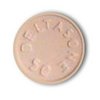 DeltasoneDeltasone is used to treat many different conditions such as allergic disorders, skin conditions, ulcerative colitis, arthritis, lupus, psoriasis, or breathing disorders.as low as $0.32
DeltasoneDeltasone is used to treat many different conditions such as allergic disorders, skin conditions, ulcerative colitis, arthritis, lupus, psoriasis, or breathing disorders.as low as $0.32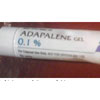 DifferinDifferin is used for treating severe acne. as low as $15.93
DifferinDifferin is used for treating severe acne. as low as $15.93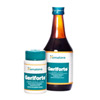 Geriforte SyrupThe antistress, adaptogenic properties of Geriforte retard degenerative changes and accelerate cellular regeneration and repair.as low as $45.45
Geriforte SyrupThe antistress, adaptogenic properties of Geriforte retard degenerative changes and accelerate cellular regeneration and repair.as low as $45.45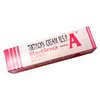 Retino-A Cream 0,05Retino-A Cream is used for treating acne. It may also be used for other conditions as determined by your doctor.as low as $16.09
Retino-A Cream 0,05Retino-A Cream is used for treating acne. It may also be used for other conditions as determined by your doctor.as low as $16.09 PrednisolonePrednisolone is used for treating allergies, arthritis, breathing problems (eg, asthma), certain blood disorders, collagen diseases (eg, lupus), certain eye diseases (eg, keratitis), cancer (eg, leukemia), endocrine problems (eg, adrenocortical insufficiency), intestinal problems (eg, ulcerative colitis), swelling due to certain conditions, or skin conditions (eg, psoriasis).as low as $0.36
PrednisolonePrednisolone is used for treating allergies, arthritis, breathing problems (eg, asthma), certain blood disorders, collagen diseases (eg, lupus), certain eye diseases (eg, keratitis), cancer (eg, leukemia), endocrine problems (eg, adrenocortical insufficiency), intestinal problems (eg, ulcerative colitis), swelling due to certain conditions, or skin conditions (eg, psoriasis).as low as $0.36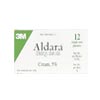 AldaraAldara (imiquimod) is an immune response modifier. Aldara is used to treat actinic keratosis (a condition caused by too much sun exposure) on the face and scalp.as low as $25.6
AldaraAldara (imiquimod) is an immune response modifier. Aldara is used to treat actinic keratosis (a condition caused by too much sun exposure) on the face and scalp.as low as $25.6